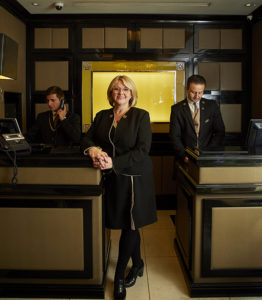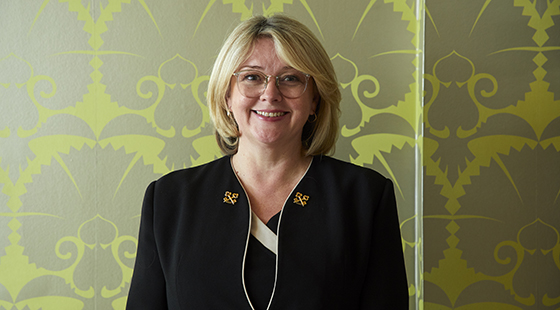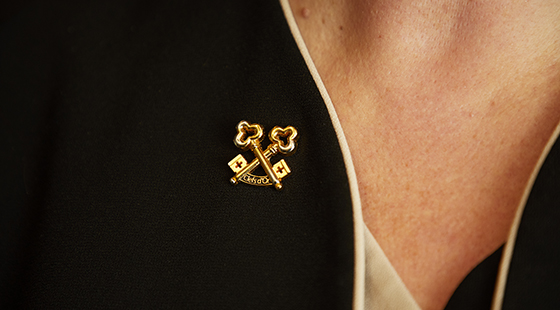Golden touch: Madeleine Calon, head concierge at the St James's Hotel & Club in London's Mayfair, on why her role will always be essential to hotels
Madeleine Calon, head concierge at the St James's Hotel & Club, thinks that the role of the concierge is now more important than ever and that the subtleties of guest interaction can never be outsourced to the internet. The first female president of the Society of Golden Keys talks to Rosalind Mullen
As you walk through the doors of the swish St James's Hotel & Club in Mayfair, the first people you will meet will be members of head concierge Madeleine Calon's team. They'll greet you warmly, direct you where you need to go and make you feel at home.
It is one of the many reasons why Calon believes concierges are here to stay, despite the mutterings of those who predict that technology will put them out of business.
She concedes that the internet means guests can book their own theatre tickets or restaurants online, but points out that they don't have the local connections or knowledge to get the best seats or tables.
"Restaurants will give concierges a table at short notice because we have a relationship with them and they trust our guests won't be a no-show. Often there is a presumption that it costs more through a concierge, but we have built relations with theatres, restaurants and attractions for years and can often purchase tickets cheaper. Guests are often cash-rich and time-poor and they want to be curated. That is our skills base," she says.
She stresses that nothing can replace human intuition and understanding, either. "There is no such thing as one size fits all," says Calon. "Often the number-one reviewed restaurant is not somewhere we would send a particular guest. Reviews are made by different peer groups who don't always suit a certain generation. Algorithms don't understand people as we do. We can fit our choices to the guest's aspirations and their lifestyle.
Calon doesn't like to rely on concierge desk software, either, though her team do use guest preferences - such as the fact a regular visitor always books a certain restaurant.
"If they seem to have forgotten, we would book it for them and gently ask if they require it. It is the personal approach," she says. "You do need technology to assist you, but you should never rely on it. If you are reliant on technology to do the thinking, it takes away your skill as a concierge."
Having reached the top of her profession, Calon knows what she is talking about. Last February she was named the first female president of the Society of Golden Keys for concierges, having also been the first British woman to become a member in 1996. Since then, 18 female concierges have joined the 386-strong society in Great Britain, and more are coming through.
Making an entrance
Calon, who is originally from Liverpool, started her working life as a stage manager in the theatre. "The parallels are uncanny," she says. "You make notes, watch people's entrances and exits, liaise with different departments and when the 'production' is on - it is intense," she says.
She took hospitality jobs to fill downtime between theatre contracts, but once she'd caught the bug, she didn't look back. By the late 1980s she was working at Trusthouse Forte's 1,000-room Cumberland hotel in London as a guest liaison officer, a role that she says was years ahead of its time.
"We were there long before lobby hosts," she says. "If there was a queue at the carvery, we would interact with the guests so they felt acknowledged and not neglected or frustrated."
While some may say the downside of working in guest relations is that everyone is coming to you with a problem, Calon says: "I loved it because you got the chance to resolve and turn the guest experience around to a positive. I learned that you can build more of a relationship with guests and colleagues if you use a carrot rather than a stick. Empathy brings resolution and non-repetition."
But it was her next move, as guest relations manager at the Waldorf hotel, that gave her an insight into the role of concierge. "I was standing next to the concierge desk when I thought 'that is where it is happening'."
So in 1993, after five years in guest relations, instead of accepting a front office management role, Calon made the decision to become a concierge.
"I noticed that the more senior you were, the less you saw the guests - and that is not why most of us go into hospitality," says Calon. "The only place where I saw that guest contact never diminish was the concierge desk, so I said I'd like to move there."
It was a bold career change 25 years ago. While head concierge Mel Demetriades recognised the benefit of harnessing Calon's stage management and guest relations skills, her move unsettled others.
"There was surprise because I was a girl, and concierges were associated with the [male domain of the] luggage department. Plus, the natural succession is usually page, doorman, junior concierge and then concierge. Today, there are still very few female porters or door staff," she explains. "I went in as a junior, so there was a pay decrease. People thought I was an idiot to drop from the management team."
Demetriades gave her one-to-one tuition during the six-month refurbishment of the Waldorf and then trained her on the job. Even today, Calon says the concierge element of hospitality training in colleges is minimal, though she adds that crucial skills such as gaining knowledge of the area and attractions local to the hotel simply cannot be taught (see below).
"Concierges use all kinds of skills," says Calon. "I never knew I would have to be so good at botany, for instance - every guest will ask me what the flowers in the lobby are."
The early days were a learning curve and Calon tried to conceal her lack of local knowledge by doing time-consuming research rather than asking concierges at other hotels - which is the norm. Nowadays, concierges use WhatsApp groups, but previously they used "the chain", whereby when anyone needed information they would ring five hotels, who would ring another five and so on, until someone could help.
"I didn't pick up a phone because I was worried they would [dismiss me as] a girl. I was scared of looking stupid. But it was more stupid for me to do it the long way and wade through Kelly's Directory and the Egon Ronay guides," she says, adding: "It pre-dated Google."
She admits now that her worries were ill-founded. Members of the Golden Keys live up to their motto of 'Service through friendship', and they all share information across hotels.
"The thought is always: 'is the guest going to benefit?'," says Calon. "For instance, if I know I won't make it to Harrods before closing to get something for a guest, I can ring the concierge at the Capital [hotel] round the corner and they will get it for me. There is a bond of support."
Five-star career
Calon's career as a concierge rose steadily over the years. In 1996, she became assistant concierge at the Cavendish, followed by a move to the five-AA-starred Berkeley in 2001 where she was promoted to concierge services manager, overseeing a team of 29.
In 2008, the opportunity to do an opening drew her to the St James's, which was undergoing a £60m refurbishment. Unsurprisingly, she heard about the job through the concierge network.
The 60-bedroom five-red-AA-star hotel, which has a Michelin-starred restaurant, Seven Park Place, is one of the smaller properties to employ concierges who are members of the Golden Keys. Calon describes it as "the happiest of hotels" where she manages a team of 10, including two porters and two doormen, who ensure everyone is made welcome. "We don't raise eyebrows when kids are here. We are a five-star hotel that likes families. You have to develop all the time and look at anything that happens outside a hotel to make a guest happy."
As for unusual guest requests, Calon takes it in her stride: "If they can afford it, to them, it's just shopping. It's the emotional side that is more difficult - hiding the engagement ring is joyful, but being involved in more traumatic moments is hard," she says. For instance, she was once asked to set up a meeting with the Archbishop of Canterbury, which turned out to be do-able. But, being asked to find the "very best doctor" by a man who feared his wife was miscarrying was tough.
Calon clearly loves her profession. "You may get asked the same question, but not by the same people, so you never get the same day twice," she says. "Different things are important to people who have different needs - such as a wheelchair-user or a family."
And being president of the society is equally rewarding. "I have travelled all over the world - to the Philippines, Malaysia and Europe. In April I was in Seoul for the Les Clefs d'Or annual international congress, where we share best practice and attend seminars such as 'Is AI going to reduce the concierge's relevance?'"
She regularly offers young people work experience to hook new talent, but she notes that concierge teams see less staff turnover than other departments. "There is more stability because it is a great job," she says. "You get the best elements of working in hospitality because guests see you as an ally compared with other members of staff. Guests don't come to you with negative comments," she says. "You see the difference in how you are spoken to because they trust you to resolve their problems."
As for diversity, the concierge profession has certainly come a long way since Calon became the first British woman member of the society 23 years ago.
"When I went to the first meetings there was one French woman and one Filipina. At meetings members would assume I should be at the associates networking event next door. I didn't want to get on my high horse, so I would shake their hand and say 'we mustn't have met, I'm…'." She smiles as she adds: "Meetings would often start with, 'Good evening Madeleine and gentlemen'."
So how does she feel about the fact that more women are becoming concierges, with 18 and counting now wearing the Golden Keys badges? "I am happy our numbers are increasing," she says, "but I would rather have a limited number of female concierges than have tokenism. It is about getting the right person for the job."
A glimpse into the Society of Golden Keys
The society, which started 66 years ago, is affiliated to the Union Internationale des Concierges d'Hotels - Les Clefs d'Or. Its aim is to enable concierges to share knowledge that will help them to deliver exceptional guest experiences - hence the motto 'Service through friendship'- as well as development and training. To this end there are monthly meetings nationally and annual meetings internationally.
Being accepted as a member is not a given. Applicants will have been a concierge for five years and need to be proposed and seconded. They are then interviewed to ascertain knowledge, experience and integrity, and the application is then presented to the entire membership for approval.
Once successfully through this tricky process, the candidate is presented with the famous Golden Keys lapel badges, made by Swiss jeweller Bucherer, and they become part of a global support network.
www.lesclefsdorgb.org
So you want to be a concierge?
•Start applying for roles even as early as after your GCSEs to get on-the-job training.
•Make sure you have empathy and a human touch.
•Check that you have a desire to learn and research. You will need to know the layout of your local area. Little things make a difference - get to know the local businesses. If you can recommend a pharmacist in Boots because you have a relationship with her, the guest will feel trust, too.
•Develop your contacts.
•Be generous with your contacts.
Continue reading
You need to be a premium member to view this. Subscribe from just 99p per week.
Already subscribed? Log In













